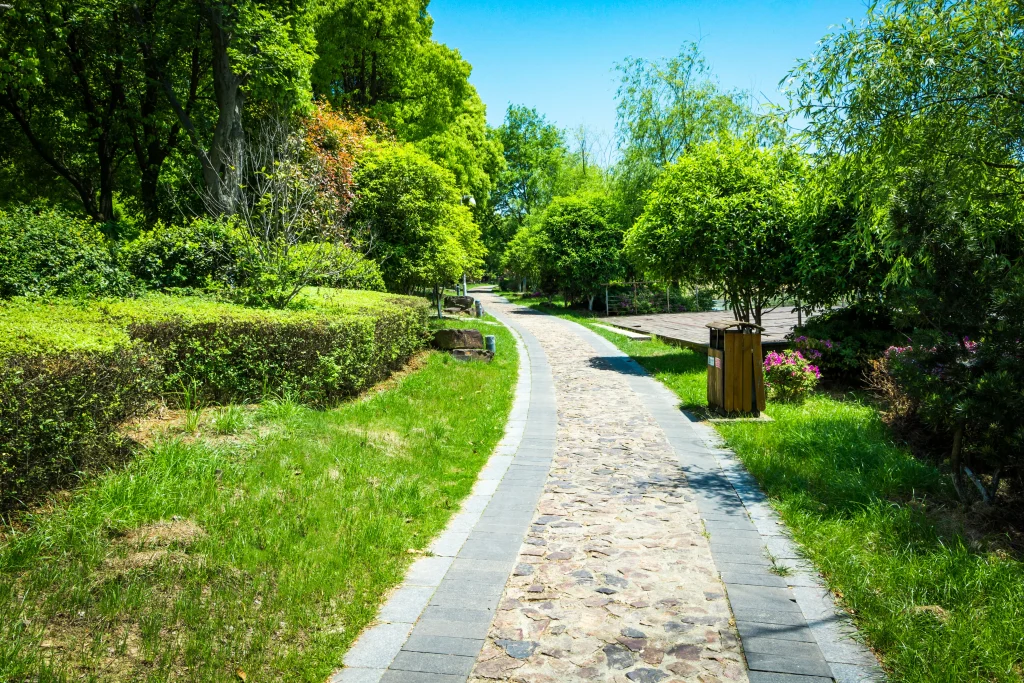How much does a yard of topsoil cover? A cubic yard of topsoil covers approximately 100 square feet at a 3-inch depth.
For perspective, that’s an area measuring 10 feet by 10 feet with topsoil spread 3 inches deep. When spread thinner to 1 inch, the same yard covers 324 square feet, while at 6 inches deep, coverage reduces to just 54 square feet.
For homeowners, understanding precise topsoil measurements prevents wasteful spending and project delays. Our region’s unique soil challenges – from clay-heavy composition to alkaline pH levels – make accurate calculations essential for successful landscaping projects.
What Is a Cubic Yard of Topsoil?
A cubic yard equals 27 cubic feet, measuring 3 feet × 3 feet × 3 feet. Suppliers sell topsoil in bulk cubic yards or bagged quantities (typically 40-pound bags containing about 0.5-0.75 cubic feet).
For substantial projects, bulk purchases save money. A cubic yard of topsoil weighs between 1,800-2,500 pounds depending on moisture content and composition. Topsoil tends toward the heavier end due to clay content, especially after rainfall.
Bulk topsoil arrives as a mound approximately 3 feet high by 3 feet wide. For reference, most standard pickup trucks can safely transport half to three-quarters of a cubic yard per trip.
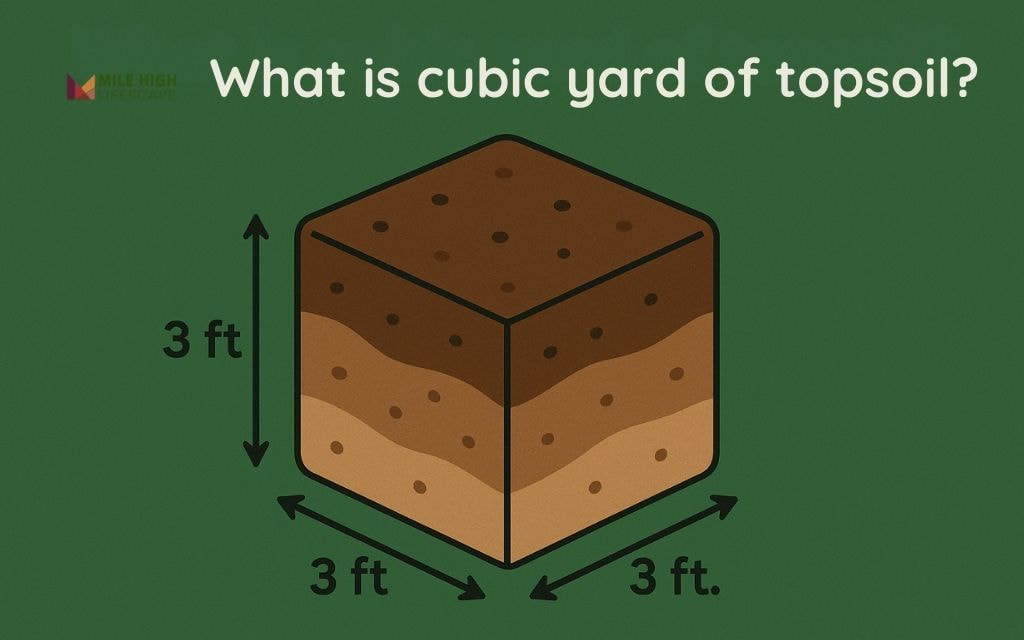
How Much Does a Yard of Topsoil Cover?
The coverage area varies significantly based on your desired depth. The thinner you spread topsoil, the more area it covers.
Here’s a comprehensive breakdown to guide your calculations:
| Depth (inches) | Area Covered (sq ft) | Use Case Example |
| 1 inch | 324 sq ft | Lawn topdressing, refreshing thin areas |
| 2 inches | 162 sq ft | Garden bed restoration, minor grade corrections |
| 3 inches | 108 sq ft | New sod preparation, raised beds |
| 4 inches | 81 sq ft | Level corrections, significant amendments |
| 6 inches | 54 sq ft | Complete lawn renovation, major soil replacement |
For Denver landscapes, deeper applications often prove necessary when dealing with our region’s dense clay soil. During new bed creation, 4-6 inches often proves optimal to establish proper drainage and root development.
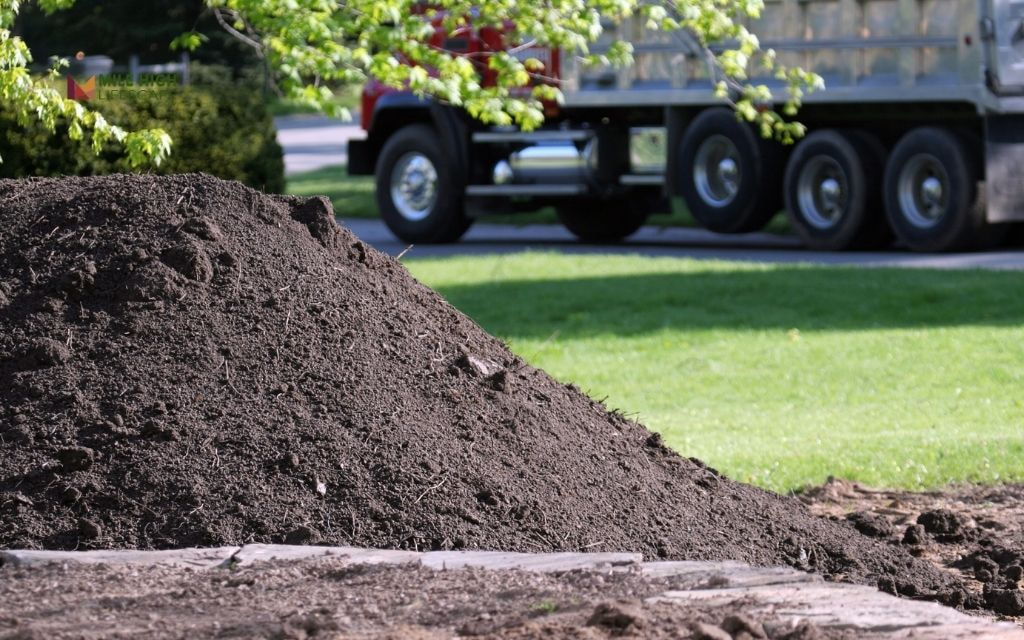
How to Calculate How Much Topsoil You Need
To determine your required topsoil volume in cubic yards, follow this formula:
Square feet × (Depth in inches ÷ 12) ÷ 27 = Cubic yards needed
Let’s work through a practical example for a garden bed:
- Measure the area: 15 feet × 10 feet = 150 square feet
- Determine required depth: 4 inches (recommended for new garden beds in clay soil)
- Calculate cubic yards: 150 × (4 ÷ 12) ÷ 27 = 150 × 0.33 ÷ 27 = 1.85 cubic yards
When ordering, round up to 2 cubic yards to account for settling, uneven distribution, and soil compaction. This prevents mid-project shortages, which create delivery delays and potential additional delivery fees.
How Much Does a Yard of Topsoil Cost in Denver (2026 Estimates)
In the Mile High metropolitan area, topsoil prices currently range from $30 to $60 per cubic yard for standard-grade material. Premium blends enhanced with compost or specific amendments typically cost $45 to $75 per cubic yard.
Most suppliers require minimum orders (typically 2-3 cubic yards) and charge delivery fees based on distance. Delivery generally adds $50-$75 to your total, though many companies waive this fee for larger orders exceeding 5-10 cubic yards.
Bagged topsoil costs significantly more per unit volume. A 40-pound bag (approximately 0.5 cubic feet) ranges from $2.50-$5, meaning you’ll pay $135-$270 for the equivalent of one cubic yard – nearly 3 times the bulk price.
For perspective, a typical front yard garden bed renovation requiring 3 cubic yards of premium topsoil would cost approximately $135-$225 plus delivery fees. Prices trend higher within city limits and lower in surrounding suburbs.
Factors That Affect Topsoil Cost
Type of Topsoil
The specific type of topsoil you select dramatically impacts both cost and performance in your landscape:
- Fill Topsoil ($20-30/yard): Basic soil primarily used for filling low spots or general grading. Contains minimal organic matter and often includes small rocks and clay chunks. Not ideal for planting but works for establishing basic contours and filling holes.
- Garden Topsoil ($35-50/yard): Higher quality soil suitable for garden beds and planting areas. Screened to remove most debris and typically contains some organic matter. Represents the standard option for most landscaping projects.
- Enriched Topsoil ($50-65/yard): Premium soil blended with compost, peat moss, or other organic materials to enhance fertility and soil structure. Particularly valuable in Denver’s clay-heavy native soil, providing better drainage and root development.
- Specialty Topsoil ($65-85/yard): Custom-formulated soil designed for specific applications like vegetable gardens, rain gardens, or native plant installations. Often includes precise ratios of sand, compost, and other amendments tailored to particular plant needs.
- Certified Topsoil ($70-90/yard): Tested and certified soil meeting specific standards for pH, nutrient content, and contaminant levels. Worth considering for edible gardens or environmentally sensitive areas in watersheds.
Size of Your Project
The scale of your landscaping project directly affects both unit cost and logistical considerations:
Small Projects (Under 2 yards):
- Typical applications: Single garden bed, small lawn repair, or container gardening
- Cost considerations: Higher per-yard rates apply, with minimum delivery fees often exceeding the soil cost itself
- Alternative options: Consider bagged soil (despite higher unit cost) or combining with neighbors to reach delivery minimums
- Typical Denver cost impact: Expect to pay premium rates ($45-60/yard) plus full delivery charges ($50-75)
Medium Projects (2-10 yards):
- Typical applications: Complete garden installation, lawn renovation, or multiple raised beds
- Cost considerations: Standard pricing applies, with modest bulk discounts starting around 5 yards
- Delivery efficiency: Falls within standard delivery parameters for most suppliers
- Typical Denver cost impact: Standard market rates ($35-50/yard) with standard delivery fees ($45-65)
Large Projects (10-20 yards):
- Typical applications: Complete yard installation, major landscape renovation, or commercial property work
- Cost considerations: Bulk discounts typically apply, reducing per-yard costs by 10-20%
- Delivery efficiency: May qualify for reduced or waived delivery fees
- Typical Denver cost impact: Discounted rates ($30-45/yard) with reduced delivery fees ($25-45 or waived)
Major Projects (20+ yards):
- Typical applications: New construction, large property development, or community projects
- Cost considerations: Wholesale pricing often available, especially with established supplier relationships
- Delivery efficiency: Multiple truckloads required, but per-load costs decrease
- Typical Denver cost impact: Wholesale rates ($25-40/yard) with minimal or waived delivery fees
Soil Quality and Grade
Topsoil quality varies dramatically and directly impacts both price and performance:
- Economy Grade ($20-30/yard): Basic fill dirt or unscreened native soil. Contains rocks, clay chunks, and minimal organic matter. Suitable for basic fill projects but requires significant amendments for plant growth.
- Standard Grade ($35-45/yard): Partially screened with some organic content. Works for general landscaping but may contain occasional rocks or debris.
- Premium Grade ($45-60/yard): Thoroughly screened (⅜-inch or finer) with higher organic content. Provides consistent texture and improved water retention. Recommended for raised beds and garden installations.
- Specialty Blends ($60-75/yard): Custom-mixed soil containing precise ratios of compost, sand, perlite, or other amendments. Designed for specific applications like vegetable gardens, native plantings, or xeriscape projects.
Order Volume and Bulk Discounts
Most suppliers structure pricing tiers based on total order volume:
- Small Orders (1-3 yards): Pay standard retail pricing, plus full delivery fees.
- Medium Orders (4-9 yards): Often qualify for 5-10% volume discounts and reduced delivery charges.
- Large Orders (10+ yards): Can receive 10-20% discounts on per-yard costs and may qualify for free delivery.
- Commercial Volume (20+ yards): Wholesale pricing available, significantly below retail rates.
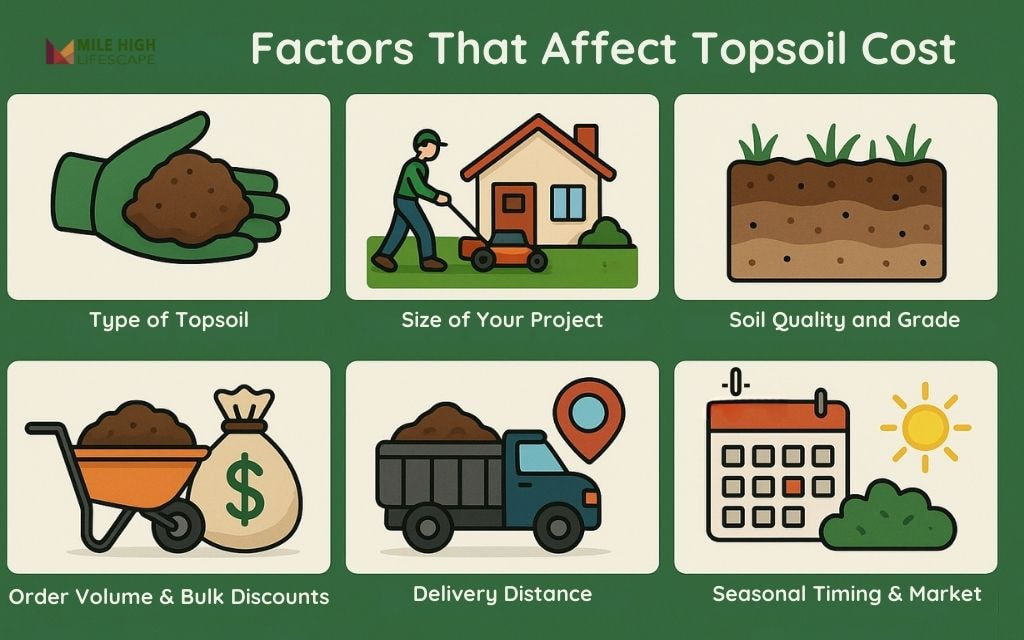
Delivery Distance and Accessibility
Transportation comprises a significant portion of your total cost:
- Delivery Base Fee: Most suppliers charge $45-70 base delivery fee.
- Distance Surcharges: Expect additional fees for deliveries beyond 10-15 miles from the supplier’s yard. Typically adds $2-5 per mile for distances beyond the standard delivery zone.
- Access Limitations: Narrow driveways, steep terrain, or limited dump space may incur additional fees or require specialized equipment. Some Denver mountain communities face substantial delivery surcharges.
- Drop Location: Having the supplier place topsoil exactly where you need it (rather than at the end of your driveway) may incur an additional positioning fee.
Pro tip: Ask suppliers for their delivery zone map – some Denver suppliers have multiple yards throughout the metro area, and ordering from the closest location can significantly reduce delivery costs.
Seasonal Timing and Market Fluctuations
Topsoil pricing follows predictable seasonal patterns:
- Peak Season (April-June): Highest demand period with premium pricing. Expect to pay 10-15% more during this window, with longer lead times for delivery.
- Mid-Season (July-September): Moderately high demand with standard pricing. Better availability and somewhat more flexible scheduling.
- Off-Season (October-March): Lowest demand with potential discounts. Many suppliers offer promotions to maintain business during slower months, though weather conditions may limit installation options.
- Fuel Price Impact: Transportation costs fluctuate with diesel prices, which can affect delivery fees throughout the year.
Tips to Maximize Topsoil Efficiency in Your Projects
Follow these proven strategies to optimize your topsoil investment:
- Prepare Existing Soil First: Till native soil 4-6 inches deep before adding topsoil to prevent layering and improve integration. This creates a gradual transition zone rather than sharp boundaries that impede root growth and drainage.
- Apply in Stages: For depths exceeding 3 inches, apply topsoil in multiple layers, lightly watering between applications. This prevents compaction and allows proper settling.
- Address Drainage Issues: Clay-heavy soil often requires drainage improvements. Consider incorporating pea gravel in low spots or adding landscape fabric beneath raised beds to prevent soil migration.
- Incorporate Organic Matter: Mix compost with new topsoil at a 1:3 ratio to improve microbial activity and enhance long-term soil structure. This accelerates the development of healthy soil ecology.
- Consider Soil Testing: Denver soils typically present high alkalinity (pH 7.5-8.5). Basic soil tests cost $15-$30 and help determine if amendments like sulfur or gypsum should accompany your topsoil application.
- Time Applications Strategically: Apply topsoil during moderate weather conditions. Hot summer days cause moisture loss, while frozen ground prevents proper integration during winter months.
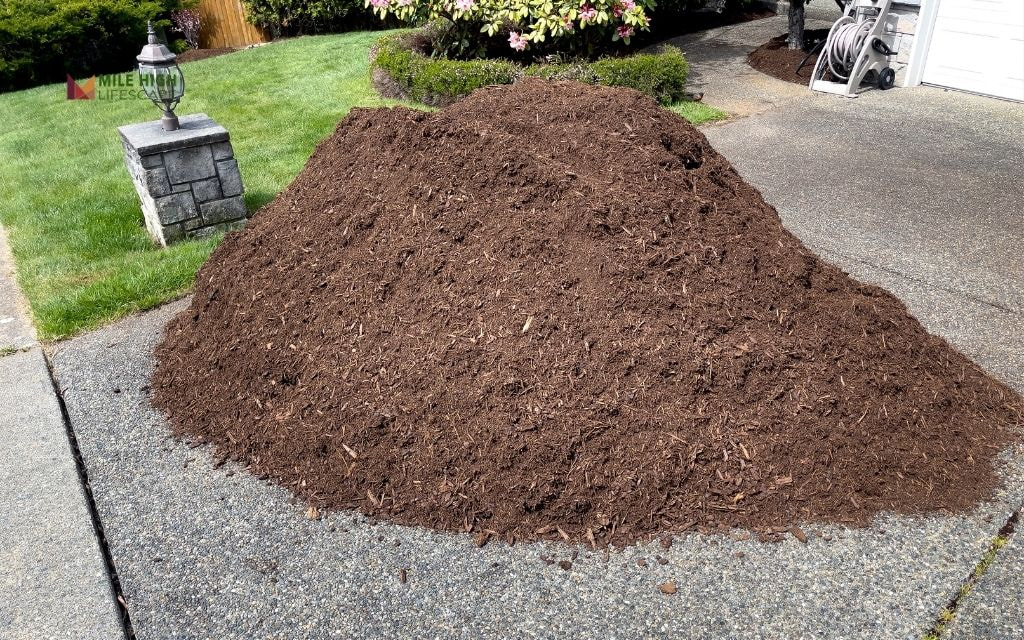
Conclusion
Understanding topsoil coverage calculations impacts project success and budget management. For homeowners contending with our region’s challenging soil conditions, accurate planning prevents common pitfalls like under-ordering or overspending.
Remember that quality matters as much as quantity. Premium topsoil provides superior results through better drainage, nutrient availability, and reduced weed pressure – benefits that outweigh modest price differences over time.
For professional landscape transformation, contact Mile High Lifescape. Our experts provide precise topsoil recommendations, reliable delivery, and complete installation services throughout the Denver metropolitan area.
Frequently Asked Questions (FAQs)
How much do 2 yards of topsoil cover?
Two yards of topsoil will cover approximately 200 square feet at a depth of 3 inches. This means it would cover an area roughly 10 feet by 20 feet (10′ x 20′) or 20 feet by 10 feet.
How do I calculate how much topsoil I need?
To calculate how much topsoil you need, multiply your area’s length by width to get square feet. Then multiply by your desired depth (in feet), which converts to cubic feet. Divide this figure by 27 to determine cubic yards. For example: a 10′ x 10′ area at 3″ depth equals 25 cubic feet or 0.93 cubic yards.
How big of an area will 1 yard of topsoil cover?
One cubic yard of topsoil will cover approximately 100 square feet at a depth of 3 inches. This means a 10-foot by 10-foot area can be covered with a 3-inch layer of topsoil using 1 cubic yard.
Will 1 yard of topsoil fit in a pickup truck?
Yes, most standard pickup trucks can safely transport 1 cubic yard of topsoil, though weight becomes a concern. A cubic yard weighs 1,800-2,500 pounds, which approaches or exceeds the payload capacity of many half-ton pickups. For safety, consider multiple trips or delivery services for larger quantities.
Is 2 inches of topsoil enough to grow grass?
For starting a new lawn, 2 inches of topsoil proves sufficient if your existing soil contains adequate organic matter in the top 4-6 inches. In clay-heavy soils, 3-4 inches typically produces better results, especially for high-traffic areas or drought-resistant varieties. The deeper soil profile encourages stronger root development and improved drought tolerance.
